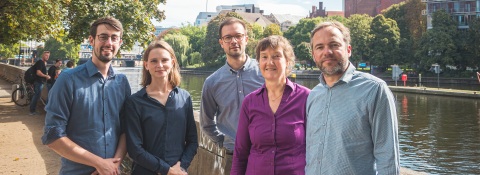Meet the Team: Berliner Wasserbetriebe

January 12, 2023
What are your main tasks in the project?
BWB has several tasks and supports the project on different levels. For example, we are involved in developing and refining analytical methods to detect industrial chemicals such as per- and polyfluoroalkyl substances (PFAS). We are also developing treatment systems to remove PFAS in drinking water production. This involves creating a planning and designing tool that can support to plan the removal of harmful chemicals in drinking water treatment. In addition, we are active in the monitoring of wastewater treatment plants and urban runoff.
What are your goals?
Again, there are several points to mention: First, we want to integrate new analytical methods for PFAS and other compounds into laboratory practice. Second, we are aiming to remove PFAS and other industrial chemicals from water. For example, we want to implement efficient fixed-bed processes for removing these chemicals from source water with high organic carbon content. We also want to develop ready-to-use planning and designing tools to remove PFAS in drinking water production, for example. Of course, we also want to help prevent chemicals from entering the soil-sediment-water system in the first place. One of our goals is therefore to identify potential sources of hazardous chemicals along the urban water cycle by using novel passive sampling approaches.
What do you particularly like about the project?
The project promotes international cooperation and networking between several European partners, who come, among others, from research institutions, federal authorities, or technology companies. These different backgrounds allow us to compile a great deal of knowledge and to cover a broad spectrum.
How does your work help the general public?
The PROMISCES Project is able to address a group of compounds which must be regulated stringently. Therefore, the project and our work in particular will gain important information for the EU regulation for hazardous compounds in the water cycle, e.g. drinking water directive, groundwater directive and surveillance of the industry sector.
With our work we aim to improve the safety of drinking water resources and to strengthen water treatment processes, ultimately ensuring futureproof water services.
